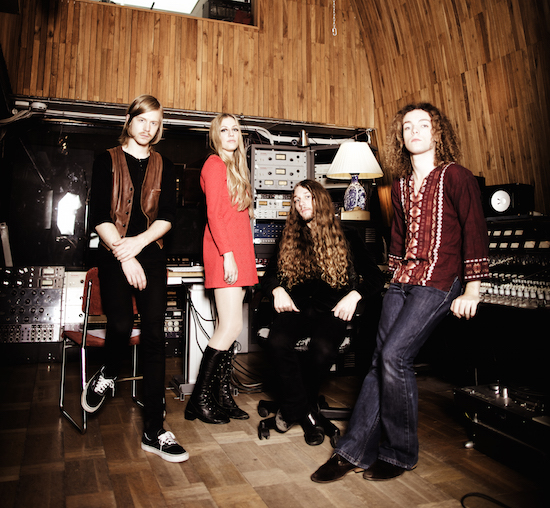Just as there are those who are still sore since Dylan went electric, there are bands for whom the past is a constant source of inspiration and enthralment. And if, as L.P. Hartley said in his 1953 novel The Go-Between, "The past is a foreign country: they do things differently there", then the multicultural spread that is the psychedelic blues-rock outfit Blues Pills is the very personification of that statement.
With members hailing from Sweden (vocalist Elin Larsson and drummer André Kvarnström), France (guitarist Dorian Sorriaux) and America (bassist Zach Anderson), Blues Pills have taken the template of classic psychedelic rock and built their sound upon it. But what separates the band from any number of retro-fetishists is a contemporary consciousness that manifests itself in the band’s socially-aware lyrics. Not for them tales of goblins and maidens fair but the cruel and constantly frustrating realities of life in the 21st century which are articulated by Larsson’s powerfully voiced howls of rage.
With the band barely out of their 20s – the prodigiously talented Sorriaux has yet to complete his second decade, in fact – Blues Pills are less about nostalgia and more about drawing from the deep well of inspiration from a time when giants walked the earth. Their self-titled debut album has made its presence felt on the continent where it gatecrashed the German album charts, while their assaults on the UK have seen Blues Pills gain new converts along the way. With new material mooted for the end of next year, the indicators are that the quartet is blessed with the requisite staying power. But then again, that’s what Blues Pills are for…
How did Blues Pills, a band from three countries, get together?
Elin Larsson: It formed in a kind of weird way. I’d lost my job in Sweden so I went to California for a vacation. I was there for about six months and I met Zach Anderson and his step-brother Cory Berry who played drums on the album. So me and Zach started writing songs together for fun and the three of us recorded these demos in their dad’s garage. We put the demos up on YouTube and from doing that we got these offers, like going on tour in Spain and Portugal. We also then got offered to release an EP on a Swedish independent label and that was awesome. But we needed a fourth member because Zach and Cory used to share playing the guitar. They’d met Dorian like a year before…
Dorian Sorriaux: … and I was playing with another band and had opened up for Zach and Cory’s old band and that’s how I met them. After that we kept in touch via Facebook…
EL: … and we sent him the demos and he played the solos over them. This was all done without us ever playing together! We all eventually met up in Sweden and we practised and then we all went off on tour. Eventually the guys all moved over to Sweden. It turned out really well. When we all met in Sweden we all got on really well and the tour we did felt really good. From that moment on I felt like we had something really special, both musically and coming from the soul.
The music of Blues Pills is very much rooted in the sound of the late ’60s/early ’70s. What’s the appeal of that era?
EL: There are a lot of great bands around today but back then there were really good musicians and great singers and songwriters. They were doing it for themselves and that’s more honest and so much more about emotion. To me, it’s more of a living music than compared to some of the stuff from today. You can hear plenty of good modern music but what attracts me to the music of that period is that so many of the voices are really raw and honest.
DS: Yeah, that’s how I feel. There’s no attitude or hundreds of overdubs and things like that. I guess it’s also a matter of taste that I like the blues and rock music from that time. I’m certainly not saying that music from today is shit.
EL: For us, because we weren’t even born then, discovering an old band is like discovering a new band. You can got to a record store and find some new music but at the same you could find an old band that’s super awesome, and that’s exciting.
An interesting aspect of the album is social consciousness contained within the lyrics. Do you view that as an artistic responsibility?
EL: I think it’s more of a reaction to how I see the world. Zach and I wrote the lyrics to the album and for me, they have to mean something; they have to be something that I can relate to and have a feel for. Otherwise I wouldn’t be able to sing and I wouldn’t be honest. During these times, so many homeless people are walking the streets of Sweden and those numbers are going up. And of course you see all this and it affects you. It’s sad that I have to write about it but it’s something that touches me so I have to say something. It’s that bad in Sweden but I think they’ve introduced laws in Norway and Finland where it’s now illegal to beg on the streets. People shouldn’t have to live like that, you know? When I was growing up you didn’t really see that but now you have people begging outside food stores and that’s really sad.
Do you think that music can alter the way people think about things and see the world?
EL: Maybe. I mean, that’s the thing with music. It can mean one thing to one person and something different for someone else. It’s like when I look at a painting; someone else can see something different from me. But it can definitely bring people together and that’s the great thing about concerts; you can find yourself with people that you wouldn’t normally see but you all have a common interest and hopefully that can have a positive effect. I don’t think we can change the whole world but I hope that people who do listen to our music take something good from it.
The album’s cover was designed by Marijke Koger who, as a member of Dutch collective The Fool, helped design The Beatles’ Apple Boutique, as well painting guitars owned by George Harrison and Eric Clapton. How did you come to work with her?
EL: She designed the album cover for The Incredible String Band’s The 5000 Spirits Or The Layers Of The Onion and we’ve always loved that artwork. Zach said, ‘Maybe we should get in touch with her? She could do a cover for us?’ and I was, like, ‘Yeah, right…’ But he got in touch with her through email and she listened to our music and really liked it. She told us that she could paint something completely new or we could license one of her paintings from the 60s. She sent some over and when we saw that one we said: ‘That’s incredible!’
We’re so honoured to work with her. We haven’t met her. She lives in California but hopefully, when we play there next year, she and her husband will come to our show.
Blues Pills is out now via Nuclear Blast. The band begin a European tour later this month, which heads to the UK in April – take a look at the dates below:




